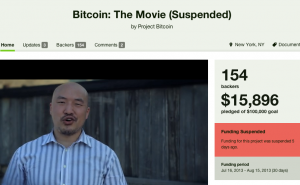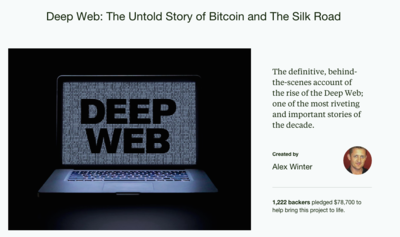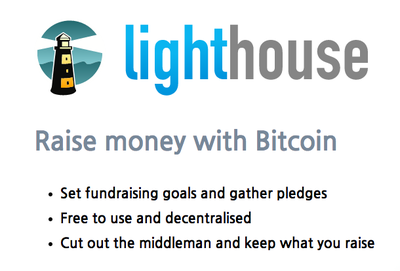Bitcoin and Crowdfunding: An Impossible Love Story?
Contents
[hide]Preliminaries: How did you two meet?
It could have been due to a fortuity that both Bitcoin and Kickstarter, which is considered the “the largest and dominant crowdfunding site”[1], were created simultaneously at the beginning of the global financial crisis of 2008. But apart from the timing, both internet-based modes of exchange seem to share certain features, such as the alleged absence of intermediaries besides themselves (Groshoff, 2014: 549) or the supposed empowerment of crowd decision-making. However, although it seems logical that a funding platform that depends on the internet uses a payment method which is specifically designed for online transactions, Kickstarter has hitherto refused to accept Bitcoins as a mode of exchange.
In spite of the similarities that one could find between Bitcoin and Kickstarter at first glance, while the first is a system created and owned by its users, the second is dependent on governments regulations and financial institutions. Besides, Kickstarter is also reliant on a payment processor in order to collect and handle the money transactions. Contrary to what Groshoff asserts, those companies do act as intermediaries, charging a fee to each transaction (3-5%) apart from the steady 5% that the platform gets for each funded project[2]. That makes small donations impossible and makes Kickstarter subject of possible external pressures.
Kickstarter <3 Bitcoin?
Kickstarter has been used to launch fifteen projects related to Bitcoin, five of which have been successfully funded. On July 2013, for instance, "Life on Bitcoin – a Documentary Film” was baked by 247 people. The movie featured Austin and Beccy Craig, a newly wedded couple who was intending to only use Bitcoin for living during the first 90 days of their marriage. The project raised $72,995 USD, but it could be argued that the fact that they were using dollars for the development of the film was already contradictory to the intentions of the film.
Four days after "Life on Bitcoin" was funded, Andrew Wong also posted his own Bitcoin project on Kickstarter. “Bitcoin: The Movie”, which was supposed to be “a documentary on the socio-economic impact of the currency around the world”, was suspended with any explanation just two weeks after it was launched[3]. “We were not told what the issues were”, Wong Said, “that’s why we paused all Bitcoin-related activities, trying to figure out what’s going on at this moment”[4].
According to Kickstarter policy, projects can be suspended if it:
- Violates or acts inconsistently with the letter or spirit of the Kickstarter Guidelines orTerms of Use.
- Materially changes the stated use of funds
- Makes unverifiable claims
- Exhibits actions that are more closely associated with fraudulent or high-risk activity
Until now, nobody has pronounced about the reasons for the project´s removal, and it is still more intriguing given that the platform kept helping Bitcoin-related projects to be found right afterwards.
“Deep Web: The Untold Story of Bitcoin and The Silk Road”, for instance, was successfully founded in December 2013. According to its campaign, the project wanted to analyze the Deep Web, Bitcoin and the Silk Road as “an exploration of a pivotal moment in cultural history”. The project raised $78,700 USD and was released in the US on March 15 2015, getting ratings up to 7,5/10 in Imdb.
In July 2014, “Bitcoin: The End of Money As We Know It” was also funded through Kickstarter. In the campaign it was specified that the film was “intended for the mainstream audience and is scripted in an easy-to-understand language to illustrate how revolutionary this technology can be”.
The Crowdfunding-Bitcoin tandem: is it still possible?
If the existence of Kickstarter, Indiegogo and every other major crowdfunding platform is due the need of having a trusted party that assures the backer that his money is effectively going to the selected project, thanks to Bitcoin crowd funding can be decentralized. Then, none of this platforms would need to exist since, thanks to the Bitcoin technology, the users alone could sustain and verify transactions.
Instead of simply donating money, some crowdfunding platforms that are powered by block chain technology allow startups “to raise funds by creating their own digital currencies and selling “cryptographic shares” to early backers. (…) Investors in a crowdfunding campaign get tokens that represent shares of the startup they support and can actually benefit from the token value appreciation.”[5] Among the number of platforms that accept bitcoins, Swarm, Koinify and Lighthouse are probably the most popular.
Bitcoin-powered app Lighthouse, for instance, launched in January 2015 as an alternative to traditional crowdfunding. According to his developer Mike Hearn, "Lighthouse is really only about moving money around, and I think this is going to be one of the things that people find confusing about it. It's not Kickstarter in a downloadable app that's peer to peer to peer. It's the way of handling bitcoins”[6]
In fact, after a backer send coins with his app, it is the Bitcoin network which automatically manage donations and detects when enough money has been pledged. Using the smart contracts features of the block chain, if the campaign reaches its goal the money will be transferred and taken out from the backer´s wallets. Hearn also declared that “because Kickstarter is, at its heart, a project gallery and a financial gateway for funding, decentralizing that process can lead to a more vibrant process by which projects are discovered and supported.”
SWARM, on the other hand, is also a decentralized crowd funding platform that places emphasis on crypto-equity. According to tech investor Susanne Tarkowski Tempelhof, “ Instead of incorporating in a physical jurisdiction, the company incorporates directly on the bitcoin blockchain by creating a coin. Each individual “coin” becomes an equity share in the company/project (we call them Distributed Autonomous Organizations, or DAOs). Coins can then be sold to investors to raise funds or traded like corporate shares on the stock market. The crypto-equity platform is enabled through bitcoin 2.0 technology, the commitment from users to generate support from the community, and the collective intelligence of our users.”
According to SWARM website, by using Bitcoin technology “and coupling it with an ethical mindset, [the company] intends to create a fairer world, free from institutional bias, driven by human activity, and open to one and all.”
Bibliography
GROSHOFF, D. (2014), "Kickstarter My Heart: Extraordinary Popular Delusions and the Madness of Crowdfunding Constraints and Bitcoin Bubble"s, 5 Wm. & Mary Bus. L. Rev. 489, Retrieved: http://scholarship.law.wm.edu/wmblr/vol5/iss2/4
FITCHARD, K. (06/01/2015), "Kickstarter dumps Amazon Payments in favor of Stripe", Gigaom, Events, Research, Retrieved: https://gigaom.com/2015/01/06/kickstarter-dumps-amazon-payments-in-favor-of-stripe/
AYRAL, S. (23/05/2014) "Lighthouse Is A Crowdfunding Platform Built On Top Of Bitcoin", Techcrunch, Retrieved: http://techcrunch.com/2014/05/23/lighthouse-is-a-crowdfunding-platform-built-on-top-of-bitcoin/
ALOIS, J. (20/01/2015), "Bitcoin Crowdfunding Application Lighthouse is Now Available for Public Download", Crowdfund Insider, Retrieved: http://www.crowdfundinsider.com/2015/01/61342-bitcoin-crowdfunding-application-lighthouse-now-available-public-download/
................................................................................................................................................................- Jump up ↑ MOLLICK, E. (26/06/2013), The Dynamics of Crowdfunding: An Exploratory Study, University of Pennsylvania - Wharton School, Journal of Business Venturing, Volume 29, Issue 1, Pages 1–16
- Jump up ↑ Stripe, which is the payment processor that is in partnership with Kickstarter at the moment, announced in February 2015 that it would start accepting Bitcoins along with fiat currencies. However, each transaction will have a 0.5% fee per transaction.
- Jump up ↑ BRADBURY, D. (30/07/2013), "Kickstarter pulls "Bitcoin: The Movie" project two weeks after launch", Coindesk, News, Retrieved: http://www.coindesk.com/kickstarter-pulls-bitcoin-the-movie-project-two-weeks-after-launch/
- Jump up ↑ SANTOS, M. (30/07/2013), "Kickstarter stops fundraising for the project “Bitcoin: The Movie” without any explanation", 99Bitcoins, News, Retrieved: http://99bitcoins.com/kickstarter-stops-fundraising-for-the-project-bitcoin-the-movie-without-any-explanation/
- Jump up ↑ AYRAL, S. (17/10/2014) “Bitcoin 2.0 Crowdfunding Is Real Crowdfunding”, Techcrunch, Retrieved: http://techcrunch.com/2014/10/17/bitcoin-2-0-crowdfunding-is-real-crowdfunding/
- Jump up ↑ HIGGINS, S. (20/01/2015), “Bitcoin-Powered Crowdfunding App Lighthouse Has Launched”, Coindesk, News, Retrieved: http://www.coindesk.com/bitcoin-powered-crowdfunding-app-lighthouse-launches-open-beta/




